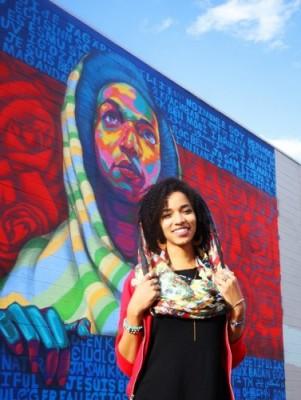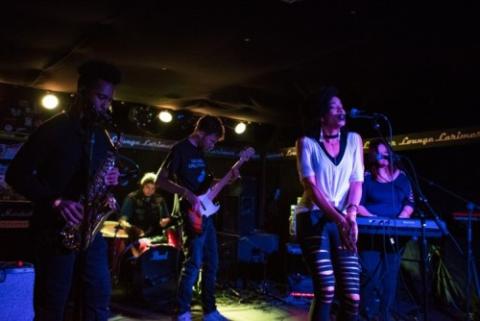“My culture is what raised me, but this American culture is what I'm surrounded by,” Salih says. “And they don't really intersect in a lot of ways.”
It’s different on stage, where cultural influences converge. Between songs, she tells the crowd about the importance of understanding and loving people for their differences.
“People can't silence your voice when you’re on stage,” she says. “That’s when you have people’s attention. You can say what you need to say and the people are listening.”
Salih’s musical roots trace back to the fourth grade, when she picked up the violin her older brother put down. A couple of years later, she was singing in the school choir.
But she had never considered performing until after college, when a friend invited her to perform with him at a little place in her hometown. The audience was wowed. Her career had begun.
She started writing poetry, picked up the ukulele and began writing songs. But she wanted to do things differently.
“People don't realize: You’re absorbing [music], consciously or not. It will affect you,” Salih says. She remembers mindlessly singing along to pop songs in the car before realizing “[the lyrics] were something so degrading and something that didn't resonate with any of my values, but I was singing it, and I wasn't even realizing it. I just really had a shift to become more intentional with my music.”
Getting to know Salih’s music is getting to know the woman behind it. Rather than exploring romance or her social life, she sings about her culture, travels and values: unity and understanding.
They are the same tenets of her work at the Barton Institute, where she coordinates projects that help the homeless, women recently released from prison and technical school students, among others.
“My mission has always been about the people, and I feel like Barton is very much about that,” she says. “Barton has helped me see the value of social enterprise and finding the need in the community through the people in the community.”
After she completes a higher education degree in the Morgridge College of Education, she wants to use music to teach, a combination that allows her to engage with bigger issues. “I love doing the community work because it helps me stay rooted and stay aware,” she says. “I feel like if I just did music, I would be isolated from the experiences that help me understand the world I'm living in.”
Back at the bar in Denver, Salih is ready to step into the spotlight and debut her latest release: an Arabic-covered EP titled “Salam,” or peace. Each song, she says, blends soul, classical, reggae, old school, R&B and funk.
It is diverse and it is different. But so is she.
And as she sings on this night, Zanib wants to celebrate that she always will be.










